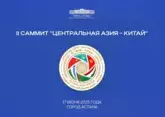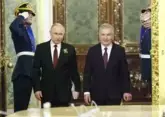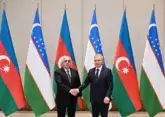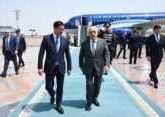In early February, President of Uzbekistan Shavkat Mirziyoyev will visit Moscow. Uzbekistan is now at the active development stage, being liberalized, establishing good relations with neighbors and non-regional players. The First Deputy Minister of Foreign Affairs of Uzbekistan, Ambassador Extraordinary and Plenipotentiary Ilkhom Nematov told Vestnik Kavkaza about Tashkent's foreign policy.
- What is the current relationship between Central Asian countries?
- Once, American experts evaluated Central Asia as a tangle of political, economic, humanitarian and environmental concerns, expressing fears that this tangle of concerns could lead to clashes between countries in the region. The concerns regarding Uzbekistan and Tajikistan, which were in dispute over water resources, the Rogun Hydropower Plant and the border; as well as regarding Uzbekistan and Kyrgyzstan, arguing about water and gas reserves were particularly high.
But due to the new thoughtful, constructive, friendly policy of Uzbek President Shavkat Mirziyoyev, all these predictions have burst like a bubble over the past three years. Now we have excellent relations with the neighboring countries in Central Asia. At the beginning of his presidency, Shavkat Mirziyoyev said that boosting relations with regional neighbors, with Russia and beyond, will be his foreign policy priority. Within a short span of time, mutual visits between all countries of Central Asia took place. Thanks to this open policy, we were able to find solutions to the most complex and complicated issues - both on water reserves and the border.
We got a very difficult border heritage. But an agreement on the demarcation of 1,170 kilometers has already been signed with Kyrgyzstan. There are Sokh and Shahimardan enclaves. The water issue is difficult to deal with. The largest consumer of water in Central Asia is Uzbekistan. The republic's population reached 34 million people. Our industry, agriculture are completely dependent on water, because all the lands are irrigated, we do not have rainfed lands. We consume 70% of the water. Water accumulates in Tajikistan and Kyrgyzstan. Uzbekistan, located downstream of Amu Darya and Syr Darya, depends on its neighbors. Therefore, the issue of water management was one of the main ones. The stumbling block was the construction of the Rogun Hydropower Plant. Now we don't have any problems. We were even ready to participate in the construction of the Rogun HPP. The Tajik leadership says it will never create water-related problems for Uzbekistan. Although, they had not created problems before. We used to come to an understanding every year. Now we have very good relations with our neighbors.
- What factors determine the maintenance of Uzbekistan's close contacts with neighboring countries?
- The first factor is political. These are security issues. No country can solve security issues alone. We are largely dependent on each other.
The second factor is economic. Our economies are complementary. The development of Central Asia requires cooperation: the rational use of water and energy resources, transport communications. Uzbekistan does not have direct access to seaports. Export is not an issue issue for us. We export goods along two routes: southern and northern. The southern route is transit from Turkmenistan to Iran via Bandar Abbas port, but Iran is currently under sanctions. The northern route is going through Kazakhstan to Russia and beyond, but it's a far and long one. The most convenient and cheapest way is through Afghanistan, but the war is not over yet there. Uzbekistan has built a railway connecting Hairatan and Mazar-i-Sharif (72 km), and now it needs to be extended. Head of our state Shavkat Mirziyoyev proposed two projects. First: Mazar-e-Sharif - Herat - Chabahar and beyond. Second: Mazar-e-Sharif - Kabul - Peshawar. If these projects are implemented, then exporting our goods abroad will be much easier. This is the economic factor that determines the maintenance of contacts in Central Asia.
The third factor is humanitarian. More than 2 million Uzbeks live in Tajikistan, more than 2 million Tajiks live in Uzbekistan. The situation is similar with Kyrgyzstan and Kazakhstan. This is our Central Asian interdependence. Therefore, signing documents on the border-related issues is very important. For example, the Uzbek-Kyrgyz border is crossed by 31 thousand people per day. The trade turnover with Kyrgyzstan increased from $100 million to $700 million. The trade turnover with Tajikistan rose from $100 million to $600 million. The trade turnover with Turkmenistan reached $428 million over the 10 months of this year. With Kazakhstan - more than $3 billion. But this is not the limit, our goal is to bring our trade turnover to $5 billion.
We are also witnessing an unprecedented increase in trade with Russia - it reached $7 billion. Russian President Vladimir Putin's visit in October 2018 was very successful. Prior to that, our president Shavkat Mirziyoyev visited Moscow. During the talks, new areas of cooperation were found. We have opened more than 10 branches of Russian universities, most recently - a branch of MGIMO.
But there are still a lot of problems, and it takes time to solve them. The people of Uzbekistan, foreign experts believe that the reform process has become irreversible. It is no accident that The Economist magazine named Uzbekistan the country of the year. They do not do that for no reason, which means that they trust us. And trust means investments, mutually beneficial cooperation. Trust is the image of Uzbekistan.
The ultimate goal of our reforms is the well-being of our people. This is not just a slogan. The government should serve the people, not the people should serve the government. Today, direct contact has been established between the government and the people through virtual receptions throughout the country. The Prime Minister's reception offices are also open.
- Is it possible that the country's open policy may have boomerang effect?
- I don't think so. Look, China feeds the whole world, it became the largest economy in the world. Remember Deng Xiaoping's saying: "If you open the window for fresh air, you have to expect some flies to blow in." This is an interesting philosophical statement. With its openness, China has succeeded. And so are we. We have introduced a moratorium on checking entrepreneurs for three years. Supporting small and medium-sized businesses is very important. Even the Ministry of Foreign Affairs is now engaged in attracting investments. At a meeting with Uzbek diplomats, the President set three goals: attracting investment, new technologies; increasing exports to foreign markets and increasing the number of tourists. This is correct because economic diplomacy prevails throughout the world.
We already have the first results. For a year and a half, we worked out more than 800 investment projects totaling more than $30 billion. Not all of them will be implemented, but the implementation of at least half of them will provide a large investment flow.
We have high hopes for tourism. Unique historical monuments have been preserved in Uzbekistan, but there were catastrophically few tourists. Now we are completely changing the structure of the tourism industry, building roads and hotels, creating telecommunications, information technology, opening family cafes and restaurants. We have canceled visas for more than 80 countries. We are developing regional tourism at a fast pace. Already 18 checkpoints have been opened on the border with Tajikistan. The first result - 5 million people visited Uzbekistan last year.
- The visit of President Shavkat Mirziyoyev to Russia is being prepared. What issues will be discussed this time?
- During our president's first visit to Moscow, a large package of documents was signed, including investment ones. Now issues in economics, healthcare, education, and culture spheres will be addressed. A lot of Russian companies already operate in Uzbekistan. There are also companies with Uzbek capital in Russia. A special issue is the relationship between universities. We will analyze the implementation of the signed agreements. There are a lot of issues, expectations are very high both from our and the Russian sides.
We have excellent relations with Russia. President Shavkat Mirziyoyev took part in the informal CIS summit. The presidents discussed a wide range of issues. Uzbekistan has revised its attitude to the results of the Great Patriotic War. There were more than 300 Heroes of the Great Patriotic War in the republic. Of the 6 million people, 1.5 million went off to war. Uzbekistan sheltered about a million people during the evacuation. The Republic is preparing to honorably celebrate the 75th anniversary of the Victory. The old names of the streets named after war heroes were returned. Now we are building a new country, a new state. European experts say: "We arrive at new Uzbekistan!" International human rights organizations have no complaints against Uzbekistan. We have disarmed them with our open, pragmatic, friendly policy.
- Moscow is looking forward to Tashkent's response to a proposal to join the EEU. Is Tashkent ready to give an answer?
- The country's participation in any organization should be useful, beneficial to this country. Smart people do the analysis, think this through and make a decision. There are factors that determine the participation of Uzbekistan in this organization.
First of all, it's geography. Uzbekistan is located in the middle of the region. If we consider the region as a single organism, then it will feel well if all its organs function properly. In the region, not a single issue - political, economic, cultural, humanitarian or environmental - will be resolved without the participation of a regional country, especially without Uzbekistan. Because Uzbekistan has huge potential - economic, political, human. Two countries in our region - Kazakhstan and Kyrgyzstan - have already become members of the EEU. They are our strategic partners. Another member of the EEU, Russia, is our strategic partner and ally. This determines the participation of Uzbekistan in this organization.
Second, Uzbekistan's steadily expanding economy requires new markets. Our relations with the European Union are quite normal, the total trade turnover has surpassed $5 billion and continues to grow. But our goods are not wanted there. Therefore, I believe that Uzbekistan should participate in the EEU.
In addition, there is a migration problem. Our population is growing by 700 thousand people per year. Migration is a natural global problem. We are building our policy based on national interests. We don't look back either to the West, or to the East, or to the North, or to the South.










